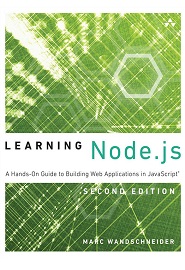
English | 2016 | ISBN: 978-0134663708 | 320 Pages | EPUB, AZW3, PDF (conv) | 53 MB
Learning Node.js brings together the knowledge and JavaScript code needed to build master the Node.js platform and build server-side applications with extraordinary speed and scalability.
You’ll start by installing and running Node.js, understanding the extensions it uses, and quickly writing your first app. Next, building on the basics, you’ll write more capable application servers and extend them with today’s most powerful Node.js tools and modules. Finally, you’ll discover today’s best practices for testing, running Node.js code on production servers, and writing command-line utilities.
Throughout the book, author Marc Wandschneider teaches by walking the reader line-by-line through carefully crafted examples, demonstrating proven techniques for creating highly efficient applications and servers.
The second edition updates coverage of Node.js to reflect changes in the technology and how it is used in the three years since the first edition was published:
- Explanation of Node’s new versioning scheme
- Updated coverage of Streams
- New coverage of installation using pre-build installers rather than from source code
- New coverage of Mongoose in the section on MongoDB
- New information about deploying Node on Heroku and Azure
- Expansion of coverage on testing
If you’re a developer who wants to build server-side web applications with Node.js, Learning Node.js is your fatest route to success.
- Build Node.js solutions that leverage current JavaScript skills
- Master Node.js nonblocking IO and async programming
- Handle more requests and increase an application’s flexibility
- Use and write modules
- Perform common JSON/web server tasks
- Use browsers to generate pages on the fly via Ajax calls and template libraries
- Simplify development with the Express framework
- Create database back-ends using popular NoSQL and relational databases
- Deploy and run Node.js apps on Unix/macOS or Windows servers
- Deploy apps to Heroku and Microsoft Azure
- Support virtual hosts and SSL/HTTPS security
- Test Node.js programs that mix synchronous, async, and RESTful server API functionality
Resolve the captcha to access the links!